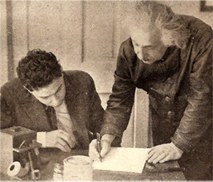Education
Texts by Dr. Antonio Moreno González
Although in his youth he aspired to be a teacher of physics and mathematics, when he eventually achieved his goal he showed little enthusiasm for the classroom, preferring to work with a small number of students and where possible only at specific times. As a result, he was an inconsistent teacher, appreciated more for his direct dealings with the students than for large classes. However, he did not supervise any doctoral theses, as one might have expected form someone who preferred to work with small groups.
In a letter to a young woman, who had complained about the treatment she had received from her teachers, Einstein recalled that he had received similar treatment in his time: "they despised me for my independence and ignored me when they wanted assistants". This corroborates our picture of someone who did not fit in well with formal education, or at least the education that was practised in the Prussian schools of his youth and childhood. Further on he writes: "At the same time, I have come to Princeton only to investigate, not to teach. There is too much formal education, especially in American centres". Nonetheless he had great regard for those who felt a vocation for education: for him "education has always been the most important means of passing on the treasure of tradition from one generation to the next...The continuity and the health of mankind depends, therefore, to an even greater extent than before, on the institutions of education". It was a maxim which he always held up as a remedy for the ills and disappointments he suffered and witnessed during his life.
He valued school not only as a centre for gaining knowledge; he considered that "qualities and skills that are valuable for the common good should be cultivated among young people". He put personal and civil training above mere learning, but the method for influencing the development of personality should not, in his opinion, be by word of mouth. "Great personalities are not formed by what they hear and say, but by work and activity... by the execution of specific tasks", tasks to be carried out freely, without fear or coercion to encourage "that divine curiosity that every child possesses, but which is often prematurely weakened".
On scientific education for young people, he wrote:
"The mind of a young person must not be stuffed with facts, names and formulas: all of these things can be found in books, without requiring any university course. The years of study must be employed only for teaching young people to think, to give them the training that no manual can replace. It is a true miracle that modern education has not managed to completely smother the holy curiosity of the seeker. I think it would even be capable of doing away with the voracity of a healthy wild animal, by obliging it, under threat of a beating, to constantly eat even when it was not hungry and, above all, by carefully choosing the food it forced it to swallow"

Helping a student
